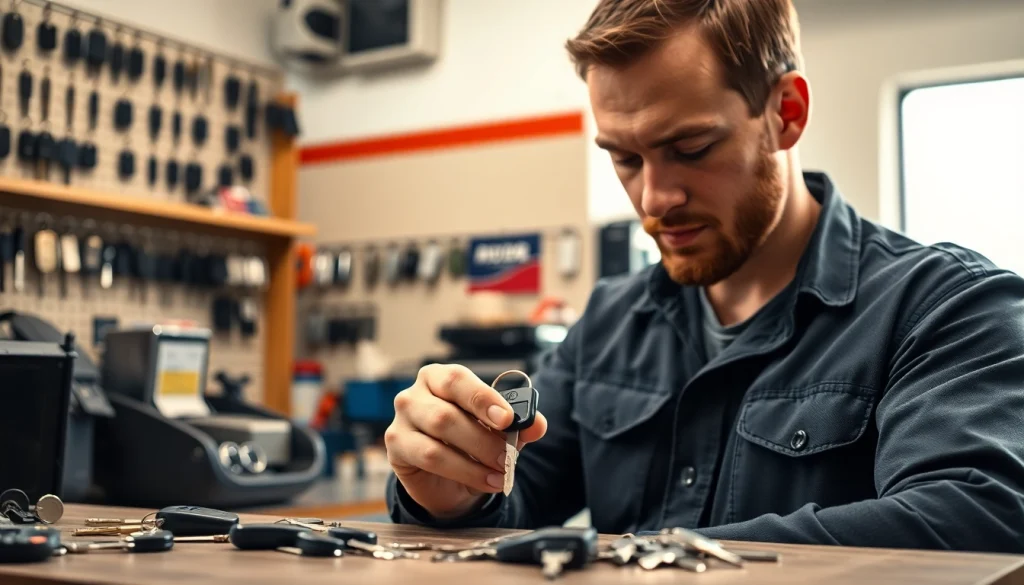Expert Guide to Replacement Car Keys: Everything You Need to Know

Understanding Replacement Car Keys
When you find yourself in need of Replacement Car Keys, understanding the options available to you becomes essential. Car keys today are not merely metal pieces that unlock doors; they integrate advanced technology that varies significantly by vehicle make and model. This guide will explore everything you need to know about the various types of car keys, their common issues, and the benefits of replacing lost or damaged keys.
Types of Replacement Car Keys
Car keys have evolved over the years. Understanding the different types can help you choose the right replacement when needed. The most common types include:
- Traditional Keys: These are basic cut keys that are not equipped with any electronic components. They are simple to duplicate and are usually less expensive to replace.
- Transponder Keys: Introduced in the late 1990s, these keys contain a microchip that communicates with the vehicle’s ignition system. If the computer does not recognize the microchip’s code, the car will not start.
- Smart Keys: Often referred to as keyless entry systems, they allow the driver to start the car and unlock it without physically inserting the key into the ignition. Instead, the vehicle detects the key’s proximity.
- Key Fobs: A key fob not only starts the car but also controls the locks and trunk. High-security cars often use key fobs for additional protection.
- Remote Head Keys: These combine a traditional key and a remote control in a single unit. They allow the owner to unlock their car from a distance while still providing traditional key functionality.
Common Issues with Car Keys
Different car keys come with their own set of challenges, particularly in replacement scenarios. Some common issues include:
- Loss of Keys: Losing your keys can be stressful, especially if you have a smart key or a transponder key that requires specific programming to replace.
- Key Damage: Wear and tear can lead to keys that no longer function properly. A worn-out key may not unlock the door or start the engine.
- Key Programming Failures: Many modern keys require programming to sync with the vehicle. If this process is not done correctly, the key will not work.
- Cost of Replacement: Depending on the complexity of the key, replacement costs can vary significantly. Transponder keys and smart keys are generally more expensive to replace than traditional keys.
Benefits of Replacing Lost or Damaged Keys
Replacing lost or damaged keys is crucial for several reasons:
- Security: A lost key can compromise your vehicle’s security. Replacing your key ensures that you are the only one with access.
- Convenience: Having a set of functional keys can save you time. If you lose or damage a key, the inconvenience can lead to unnecessary stress and delays.
- Prevent Further Damage: Continuing to use a damaged key can lead to further issues with your ignition system. A smooth replacement prevents additional problems.
- Increased Resale Value: Having multiple functional keys can enhance the appeal and value of your vehicle when it comes time to sell.
How to Obtain Replacement Car Keys
Obtaining replacement car keys has become an easier process thanks to advancements in technology and the variety of services available. Here are some methods to consider:
DIY Options for Replacement Car Keys
Some DIY options are available for those looking to save on costs:
- Key Cutting Services: Many hardware stores and locksmiths offer key-cutting services for traditional keys. You can bring your key to have a duplicate made.
- Online Services: Some websites provide services to create replacement keys based on photos or original key images. They will ship a new key to you, reducing the hassle of visiting a locksmith.
- Remote Key Programming Kits: If you have a transponder key or a key fob, some DIY kits allow you to program your keys at home. Ensure to follow the instructions carefully.
Working with Professional Locksmiths
Professional locksmiths provide extensive services that are ideal for those who prefer expert help. Here’s how to effectively work with them:
- Verification: Always verify the credentials of a locksmith. Check for licenses, reviews, and rates before engaging their services.
- Clear Communication: Provide accurate information about your vehicle and the type of key you need. This information can streamline the replacement process and reduce wait times.
- Inquire about Services: Some locksmiths offer mobile units that can perform on-site replacements, which can save you time and effort.
- Get a Quote: Always ask for a detailed quote before the services commence to avoid any surprises regarding the costs involved in your key replacement.
Using Technology for Car Key Replacement
With the boom of technology, there are several technological solutions for car key replacement:
- Mobile Apps: Some apps connect you directly to key replacement services, allowing you to order keys using your smartphone.
- Locksmith Finder Services: Online platforms can help you locate locksmiths in your area that specialize in car keys.
- Automotive Dealerships: Many car dealerships have formal structures in place to address key replacements, especially for smart keys and transponder systems, and often use technology to streamline the replacement process.
Cost Factors in Replacement Car Keys
Understanding the cost structure surrounding replacement car keys is essential for budgeting. Various factors can influence the overall price:
Understanding Pricing Structures
Replacement car key costs can vary widely based on several elements:
- Type of Key: Traditional keys are generally the cheapest, while transponder and smart keys can be more expensive due to their technology.
- Location of Service: Prices can differ between geographical locations, with urban areas typically being more expensive.
- Service Type: Mobile locksmiths may charge more for convenience, while in-store replacements usually have standard rates.
- Additional Features: Key features like key fob functionalities (trunk release, remote start) can add to the overall costs.
Insurance Coverage for Lost Keys
It’s worth checking if your car insurance policy covers replacement keys. Some policies may include this type of coverage:
- Check Your Policy: Review your insurance coverage to understand what is included regarding key replacements.
- Contact Your Insurer: Reach out to your insurer for clarity on coverage limits and any deductibles that may apply.
Comparative Analysis of Replacement Key Costs
To make an informed decision, it can be beneficial to compare costs across different service providers. Here are some tips:
- Get Multiple Quotes: Shop around to get several quotes from various locksmiths and dealerships to find the best price.
- Understand the Total Cost: Ensure you consider additional costs such as programming fees and service call fees when comparing quotes.
- Consider Warranty or Guarantees: Some locksmith services may offer warranties on the keys they produce, which could be a vital cost-saving factor.
Preventative Measures for Key Loss
Preventing key loss is often simpler than dealing with the consequences. Here are some best practices:
Best Practices for Key Care
Taking care of your keys can extend their lifespan and functionality:
- Routine Inspections: Regularly check your keys for any signs of wear, especially for remote key fobs that have buttons.
- Storage Solutions: Use designated spots for your keys at home to minimize the chances of losing them.
- Regular Cleaning: Keep your keys clean to avoid jams or malfunctions due to dirt buildup.
Smart Key Solutions
Smart technology can help reduce the risk of losing your keys:
- Key Finders: Consider using Bluetooth-enabled key trackers, which can help you locate keys through a mobile app.
- Smart Lock Systems: These systems allow you to unlock your car via an app on your smartphone, eliminating the need for physical keys.
Keeping Spare Keys Secure
If you opt to keep spare keys, ensure they are stored securely:
- Lockbox Solutions: Invest in a secure lockbox outside your home for emergency access without risking the keys falling into the wrong hands.
- Designated Trusted Person: Give a spare key only to someone you trust, and always communicate its location clearly.
What to Do After Losing a Key
If you find yourself in the unfortunate situation of losing a car key, follow these steps:
Immediate Steps to Take
React quickly to minimize chances of theft or other complications:
- Search Thoroughly: Conduct a careful search of places you have recently visited. Keys can often turn up in unexpected locations.
- Secure Your Vehicle: If you suspect your key is lost outside your home, consider contacting a locksmith to change your door locks for safety.
Contacting Your Vehicle Manufacturer
If you cannot locate your key, contacting your vehicle manufacturer may be beneficial:
- Provide Necessary Information: Prepare documents that prove ownership when you reach out to provide details on your vehicle.
- Understand Key Availability: Inquire about the keys available for your make and model as well as any programming details you may need.
Long-term Key Management Strategies
Implement long-term strategies to mitigate future risks:
- Establish a Key Routine: Create a consistent routine for checking keys before leaving home or significant locations.
- Consider an Engraving Service: Engraving contact details on your keys can help ensure their safe return if found.
- Use Keyless Solutions: Invest in technology-driven solutions to reduce reliance on traditional keys altogether.







